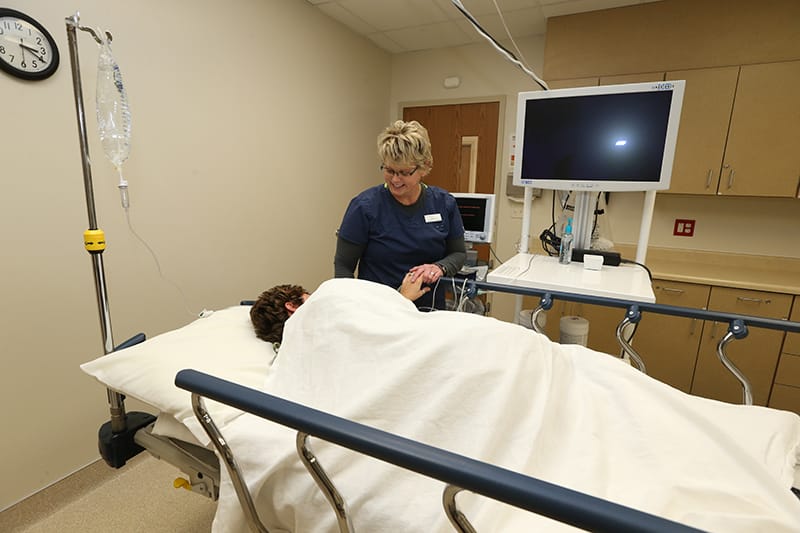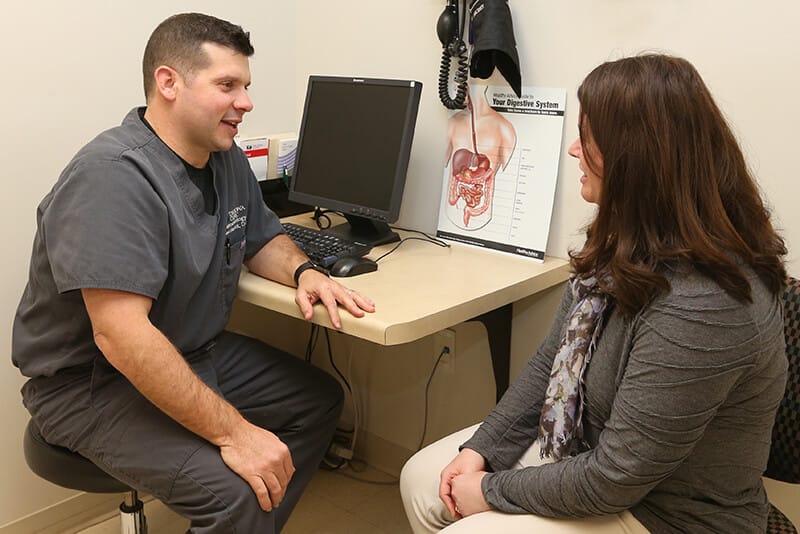The most common screening for colon cancer is still the gold standard for catching the disease early and preventing it altogether.
Posted
by Featured Provider Jonathan Fahler on Monday, March 4, 2019
 Colonoscopies aren't something you hear about much until middle age. Suddenly, everyone's talking about them and everyone's getting them.
Colonoscopies aren't something you hear about much until middle age. Suddenly, everyone's talking about them and everyone's getting them.
The screening has done wonders to decrease the death rate from colon cancer. Since 1970, when use of the newly invented colonoscopy became widespread, deaths from the disease have dropped 53 percent.
Despite its life-saving potential, many people still dread the procedure — and may even push it off. Jonathan Fahler, DO, MB, gastroenterologist at The Iowa Clinic, helped answer six common questions about colon cancer to ease your worries about colonoscopies.
What is colon cancer?
Also known as colorectal cancer, which covers cancers of both the colon and the rectum, colon cancer is the third most common cancer for men and women in Iowa. Nearly 10 percent of new cancers diagnosed every year in the state are colorectal cancers.
"It's a cancer involving the large intestine, the colon. The vast majority of colon cancers start from a polyp, a small mutation in the tissue that progresses into cancer. It's very curable as long as it's caught at an early stage," Dr. Fahler says.
Are polyps normal?
"Yeah, they are. Our guidelines suggest that when we do a colonoscopy, we should find polyps in about 30 percent of people," Dr. Fahler says. "We don't know what specifically causes people to get polyps, but there are several contributing factors. Genetics, obesity, smoking — those are all things that have been shown to potentially cause polyps."
The presence of polyps does not mean you'll get cancer. Only one in 1,000 polyps change and progress into cancer, so the vast majority are completely benign, Dr. Fahler says. And it takes about 10 years for a polyp to make the progression to colon cancer.
Are there any signs that you have polyps or that they've become cancerous?
"That's tricky. We don't have a lot of tell-tale symptoms," says Dr. Fahler. Colon polyps often cause no symptoms at all. You don't even know you have them until after your first colonoscopy. But there are some symptoms associated with polyps that you should get checked out if you have them:
- Abdominal pain – Cramps could mean that a large polyp is obstructing your intestine.
- Blood in stool – Red streaks in your stool may be a sign of rectal bleeding, which could be from polyps, colorectal cancer or less serious issues like hemorrhoids. Blood in your bowels can also turn your stool black.
- Weight loss – Of the unintentional kind. Losing 10 or more pounds in six months or less without changes to your lifestyle or diet can be a sign of colon cancer.
- Anemia – Bleeding can happen so slowly that you can't even see it in your stool. Chronic internal bleeding can lead to iron deficiency. Fatigue and shortness of breath are two signs of anemia.
"Those are the strongest indicators. They should be evaluated by your doctor," Dr. Fahler says. "Having more of those things would push us to schedule a colonoscopy."
What's a colonoscopy do?
It finds the polyps. A colonoscopy is not only used for screening for colon cancer; it's also a therapeutic procedure that can remove them before they can do harm.
"Ideally with a colonoscopy, we want to find the polyps before they ever turn into cancer and remove them," Dr. Fahler says. "We use it to make the cancer diagnosis. If we see a lesion in the colon or something suspicious, we take biopsies of the tissues for further evaluation by a pathologist to determine the extent of the disease."
The American Cancer Society updated its guidelines last year to recommend that everyone get a colonoscopy at age 45. The American Gastroenterologist Association still recommends you get your first colon cancer screening at 50 because many people don't develop polyps until that age.
But there's a catch. That assumes you're at average risk for developing colon cancer. If you have a family history of colorectal cancer or high-risk polyps, talk to your doctor about screening earlier. African Americans should be screened at age 45 because they have a higher risk of colon cancer.
After your first screening, you should get a colonoscopy every 10 years — about the time it takes for polyps to progress to cancer.
"If you have a normal colonoscopy without polyps and an average risk, 10 years is the recommendation," Dr. Fahler says. "But depending on what's found, it could be anywhere from three to five years. Even sooner than that if it's a high-risk scenario."

Prevent Colon Cancer
Finding and removing polyps before they become cancerous is the only sure way to remove your risk of colon cancer.
Schedule Online
Do I have to get a colonoscopy?
"No. A colonoscopy is not the only way to be screened. There are other methods," Dr. Fahler says. "But colonoscopy is our gold standard. The other screenings are only for people of average risk and who have no symptoms or family history."
Any screening is better than none. So if you're interested in alternatives to a colonoscopy, you have options:
- Stool-based tests – You can take stool samples from the comfort of your home to be evaluated for signs of colorectal cancer. They are less reliable than colonoscopies so you have to do them more often, annually in some cases.
- Sigmoidoscopy – Similar to a colonoscopy, this procedure checks the lower portion of the colon instead of the whole thing. It is just as invasive as a colonoscopy but not as effective. You would need to get one every five years.
- CT colonography – Sometimes called a "virtual colonoscopy," this test uses an X-ray to check your colon for polyps.
"If any of these tests come up positive, you would still have a colonoscopy. It's the only way to remove the polyps and move on to cancer treatment. These tests basically determine if you need to have a colonoscopy or not," Dr. Fahler says.
Sometimes they're just as unpleasant. The colonography and sigmoidoscopy both require the same special diet and bowel prep that a colonoscopy does. You'd have to go through all that more frequently too. Sigmoidoscopies use the same endoscopes that are passed through your rectum and inflate your colon with air, causing gas-like discomfort. While convenient, stool-based tests require the biggest commitment to regular screening.
Can I prevent colon cancer?
"Try to do everything you can to live a healthy lifestyle. Eat a balanced diet with lots of fruits and vegetables. Get regular exercise. Stop smoking. That's all going to be beneficial," Dr. Fahler says. "Knowing your family history can be beneficial to determine when to be screened. And watching for any other symptoms and getting evaluated will help."
But the single best way to prevent colon cancer is still getting the recommended screenings and colonoscopies. Finding and removing polyps before they become cancerous is the only sure way to remove your risk of colon cancer.